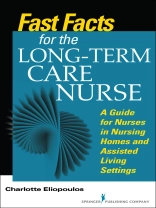Today, more than 10 million people in the United States require some form of long-term care, a number that is rapidly increasing and will continue to do so for years to come. This concise and user-friendly resource contains the fundamental information long-term care nurses need to provide all aspects of safe and effective care to their patients in nursing homes and assisted living facilities. Written by a renowned and highly respected nurse leader in long-term care and gerontology, it presents key facts and core competencies related to the clinical and managerial responsibilities of nurses in these settings. Details on the specific skills required for this challenging specialty, as well as must-know information on regulatory standards, site visits, management and leadership, and dementia care, are presented in a concise format for quick access to information.
The book embodies a holistic approach to nursing that recognizes the importance of quality of life in addition to quality of care. It provides an overview of the unique features of long-term care, addressing the operational differences between these settings and those of acute settings, the distinct responsibilities of long-term care nurses, special needs of the residents, and major clinical challenges. The text offers guidance on the use of evidence-based knowledge within the constraints of long-term care settings. Topics such as legal risks, documentation essentials, and the importance of self-care are covered, along with management and leadership issues relevant to the supervision of unlicensed personnel. The Fast Facts in a Nutshell feature assists readers in reinforcing and applying content, and a comprehensive resource list supplements the text. The book will also serve as a useful study tool for long-term nursing care certification.
Key Features:
- Embodies the essential competencies for long-term care nursing practice
- Presents information in a concise easy-to-access format with bulleted facts and the Fast Facts in a Nutshell feature
- Addresses management and leadership issues germane to the long-term care setting
- Includes must-know information on regulatory standards, site visits, legal risks, documentation essentials, and more
- Guides nurses in using evidence-based knowledge in long-term care settings
İçerik tablosu
Contents
Preface
Part I: The Basics of Long-Term Care
1. Unique Aspects of Long-Term Care
2. Settings for Long-Term Care
3. Reimbursement for Long-Term Care
4. Regulations
5. Long-Term Care Nursing Responsibilities
6. Culture Change
Part II: The Nursing Process in Long-Term Care
7. The Minimum Data Set (MDS)
8. Assessing Needs Beyond the Minimum Data Set (MDS)
9. Assessment Skills
10. Identifying Changes in Status
11. Creating Care Plans
12. Ensuring Person-Centered Care
13. Caring for Families
14. Documentation Essentials
Part III: Clinical Challenges
15. Promoting Medication Safety
16. Reducing Common Risks
17. Identifying and Managing Clinical Emergencies
18. End-of-Life Care
Part IV: Residents With Dementia
19. Overview of Dementia
20. Communication Challenges
21. Special Clinical Challenges
Part V: Management and Leadership
22. Foundations of Leadership and Management
23. Determining Staffing Needs
24. Surveys
25. Legal Aspects
26. Self-Care
References
Recommended Reading
Resources
Index
‘Yazar hakkında
Charlotte Eliopoulos, Ph D, MPH, RN, is executive director of the American Association for Long-Term Care Nursing (AALTCN) and works in private practice.












